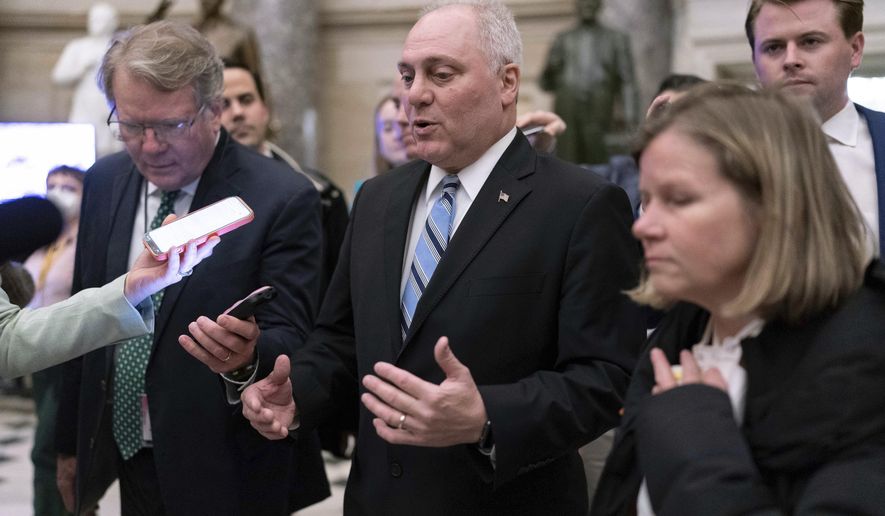The slim House Republican majority scored its first big win Monday by passing a set of rules that make significant changes to the way the chamber operates and let lawmakers take aim at reckless government spending.
Rules pushed by the most fiscally conservative House lawmakers will make it easier to pass bills that reduce federal spending and more difficult to raise the nation’s borrowing limit or increase tax rates.
“We ran on an agenda to change the way that Washington works, to fix this broken system to get our country back on track, and we were awarded the majority by the people across this country,” said Majority Leader Steve Scalise, Louisiana Republican. “Today starts that process of fixing what’s broken in Washington so that Washington can finally start working for the people of this country who are struggling.”
The rules passed on a 220-213 vote.
Two Republicans did not vote for the rules. Rep. Tony Gonzales of Texas voted “no,” and Rep. Dan Crenshaw of Texas did not vote. Otherwise, it was a straight party-line ballot with all Republicans voting “yes” and all Democrats voting “no.”
The rules package makes a key change to the Republicans’ internal accountability by reinstating a centuries-old provision allowing one lawmaker to bring up a vote to eject the House speaker.
A group of 20 conservatives insisted on adding back that provision and the other new rules in exchange for their support for Speaker Kevin McCarthy of California. They blocked Mr. McCarthy from winning the gavel for more than four days last week.
That group wants an opportunity to toss out Mr. McCarthy if he is not advancing conservative principles, especially when it comes to spending.
Mr. McCarthy was narrowly elected early Saturday after 15 ballots and will govern with a narrow majority, having only five seats to spare on any vote if all lawmakers are present.
Several key changes to the rules are aimed at reining in government spending, which has grown significantly since the start of the COVID-19 pandemic and has over more than a decade often required passing last-minute, massive “omnibus” bills that few lawmakers have time to review before voting.
The rules limit increases in direct spending and block the House from automatically raising the nation’s borrowing limit.
They slow down the passage of legislation by requiring a firm 72 hours for lawmakers to consider bills before voting.
Another change requires a three-fifths vote in the House to raise tax rates.
The changes allow lawmakers to amend spending legislation more easily by requiring each of the 12 appropriations bills to be considered separately and under an “open rule.”
Another concession on the list eliminates a provision that allows the House to raise the debt ceiling automatically when it passes a budget resolution.
The package also ends the proxy voting and remote committee hearings started by Democrats at the beginning of the COVID-19 pandemic but was routinely abused by lawmakers in both parties to skip a trip to Washington.
“What started out as a pandemic accommodation lasted far longer than necessary,” said House Rules Committee Chairman Tom Cole, Oklahoma Republican. “It’s time for the House of Representatives to return to our normal operating procedures. And it’s time for the members of Congress to actually show up to work.”
Democrats denounced the rules package and said the changes were forced by “MAGA” Republicans who they said held the House hostage last week by blocking the election of a speaker.
Rep. James McGovern of Massachusetts, the top Democrat on the House Rules Committee, said the package “was written by a small fringe group,” in the Republican conference and predicted that the new spending provisions in the rules would lead to gridlock and a government shutdown.
“People do not want government shutdowns,” Mr. McGovern said. “People do not want to see us default on our financial obligations. People want us to get stuff done and keep the lights on.”
Mr. Cole summed up the package as a blueprint for the Republican priorities in the 118th Congress while Rep. Michael Burgess, Texas Republican, said the changes respond to the message voters sent in November when they gave the Republicans the majority.
The national debt is $31 trillion, and the deficit in 2022 was nearly $1.4 trillion.
“They want the nation to go in a new direction,” Mr. Burgess said. “They want a path away from tax-and-spend politics advanced by the Democrats in the last Congress. In this rules package, we lay out how we intend to do just that.”
• Susan Ferrechio can be reached at sferrechio@washingtontimes.com.
• Mica Soellner can be reached at msoellner@washingtontimes.com.




Please read our comment policy before commenting.